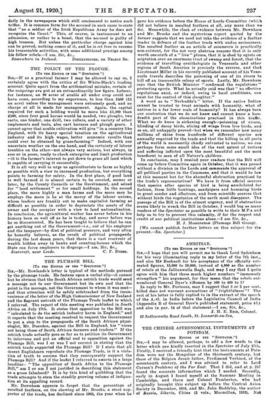THE PLUMAGE BILL.
(To THE EDITOR or THE " SPECTATOR.")
SIR,—Mr. Rowlands's letter is typical of the methods pursued by the plumage trade. He fastens upon a verbal slip—it cannot but be obvious that the South African ostrich trade would send a message not to our Government but its own and that the point is the message, not the Government to whom it was sent— and thus attention will be safely sidetracked from the incon- venience of the letter of the High Commissioner of New Zealand and the flagrant untruth of the Plumage Trade leaflet to which I referred. The report of this meeting was publiehed in South Africa on July 17th. It states that opposition to the Bill was " calculated to do the ostrich industry harm in England," and it reports that the meeting resolved to request the Government to put a stop to the propaganda of the South African physi- ologist, Mr. Duerden, against the Bill in England, his " views not being those of South African farmers and traders." If the ostrich trade actually goes so far as to petition its Government to intervene and put an official end to opposition against the Plumage Bill, was I or was I not correct in stating that the ostrich trade supported the Plumage Bill? If I state that all decent Englishmen reprobate the Plumage Trade, is it a viola- tion of truth to assume that they consequently support the Plumage Bill? And if the leaflet I referred to asserts in a large headline : " The opposition of South Africa to the Plumage Bill," am I or am I not justified in describing this statement as a gross falsehood? It is by this kind of quibbling that the trade attempts to stem the steadily growing volume of indigna- tion at its appalling record.
Mr. Downham appears to forget that the percentage of moulted feathers, on the showing of Mr. Brooks, a stout sup- porter of the trade, has declined since 1908, the year when he gave his evidence before the House of Lords Committee (which did not believe in moulted feathers at all, any more than we do). Meanwhile, the clash of evidence between Mr. Downham and Mr. Brooks and the mysterious report quoted by the former suggests that we need not take the evidence of a feather trader in defence of the feather trade with undue seriousness. The moulted feather as an article of commerce is practically non-existent, for the not very abstruse reasons that it is only worth one-sixth of a " live " plume, that it is shed by egrets on migration over an enormous tract of swamp and forest, that the evidence of travelling ornithologists in Venezuela and other regions of South America is precisely the reverse, and that Lieutenant Miller in his recently published account of his Vene- zuela travels describes the poisoning of one of its rivers to kill off an inaccessible colony of egrets. Lastly, Mr. Downham says that the British Minister " confirmed the regulations " protecting egrets. What he actually said was that " no effective regulations exist, or indeed, owing to local conditions, can exist for the control of this slaughter."
A word as to " Nerbudda's " letter. If the native Indian cannot be trusted to treat animals with humanity, what of natives in a far lower scale of humanity? It has always been eur contention that we do not know aid cannot know a hun- dredth part of the abominations practised in this traffic. What we do know is sickening enough—poisoning of rivers, blinding of decoy birds, slicing off wings from live birds, and so on, all unhappily proved—but when we remember how many millions of skins from hundreds of different species are annually required by the trade and that the killing in all parts of the world is necessarily chiefly entrusted to natives, we can perhaps form some small idea of the vast extent of torture and suffering inflicted upon the most beautiful and the most beneficent to man of all Nature's children.
In conclusion, may I remind your readers that the Bill will come up before Committee again in Octber, that it was passed without a division in the Lords and commands the approval of all political• parties in the Commons, and that it would be law at this moment but for the shameful obstruction practised by the trade's representatives? We have it from official sources that species after species of bird is being annihilated for fashion, from little buntings, sandpipers and humming birds to great condor and albatross, and from scientific sources that without birds the vegetation of the earth must disappear. The passage of the Bill is of the utmost urgency, and if obstruction seems likely to wreck the Bill in October, I would beg as many readers of the Spectator as possible to write to their M.P.s and help us to try to prevent this calamity, if for the respect and credit of our political institutions alone.—I am Sir, &c., H. J. MASSIKOHAM (Plumage Bill Group). [We cannot publish further letters on this subject for the present. —ED. Spectator.]


































 Previous page
Previous page